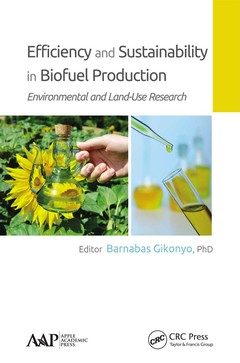Description
Efficiency and Sustainability in Biofuel Production
Environmental and Land-Use Research
Coordinator: Gikonyo Barnabas
Language: English
Subjects for Efficiency and Sustainability in Biofuel Production:
Keywords
Corn Stover; Cellulosic Ethanol; corn; File S1; stover; Ethanol Conversion; cellulosic; Ethanol Plants; ethanol; Bioenergy Potential; energy; Energy Source; crop; Cellulosic Feedstocks; life-cycle; Switchgrass Yields; assessment; GHG Emission; biomass; Doe; yields; C4 Grass; Continuous Corn Systems; LUC Type; SOC Sequestration; Fossil CO2 Emissions; Conservation Grasslands; SOC Sequestration Potential; Stover Removal; Raw Material; Seasonal Energy Storage; Corn Grain; Continuous Corn; Bioenergy Cropping Systems; Grease Interceptors
Publication date: 03-2021
Support: Print on demand
Publication date: 05-2015
· 15.2x22.9 cm · Hardback
Description
/li>Contents
/li>Biography
/li>
This title includes a number of Open Access chapters.
The world's interest in reducing petroleum use has led to the rapid development of the biofuel industry over the past decade or so. However, there is increasing concern over how current food-based biofuels affect both food security and the environment. Second-generation biofuels, however, use widely available sources such as non-food lignocellulosic-based biomass and fats, oils, and greases. They make practical consideration of how land use can simultaneously support both the world's food needs and some of its energy needs.
This volume consolidates some of the most recent investigations into these issues. The chapters focus on these categories of research:
- The problems currently connected with biofuels relating to land use and the environment
- Investigations into the potential for land use to be managed more effectively and sustainably
- Research that focuses on new and developing options for second-generation biofuels
This volume is recommended for all biofuel researchers, from the PhD student to the experienced scientist. It also offers an essential foundation to anyone interested in how biofuels relate to the future of our world.
Introduction. Part I: Land Use and Biofuels. Part II: Second-Generation Biofuels and Sustainability. Index.
Barnabas Gikonyo graduated from Southern Illinois University, Carbondale, Illinois (2007), with a PhD in organic and materials chemistry. He currently teaches organic and general chemistry classes at the State University of New York Geneseo, along with corresponding laboratories and the oversight of general chemistry labs. His research interests range from the application of various biocompatible, polymeric materials as "biomaterial bridging surfaces" for the repair of spinal cord injuries, to the use of osteoconductive cements for the repair of critical sized bone defects/fractures. Currently, he is studying the development of alternative, non-food biofuels.
These books may interest you

Third Generation Biofuels 52.74 €



